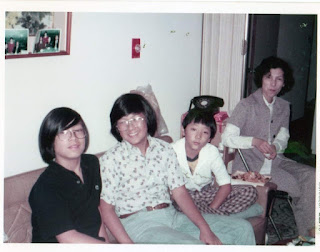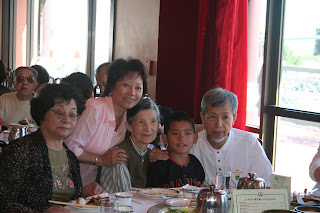Here is a small group of images of my mother, collected from various travels and sources.
Representing her early life, there are images from a cousin that show her childhood in southern Taiwan – the panel featuring my mother and her sister, SK, is particularly fun. There are wallet photos that she kept from her school days, as well as images that my father saved of their life together as post-grad students and a young married couple in Wisconsin.
Here are others images from our life in West Virginia, from our own collections and shared by other relatives. This period includes several trips to Japan and destinations all around the US.
After West Virginia, here are pictures from a time when my folks lived in Cleveland, while we three brothers went to schools and started our lives all over the US, as well as continued international travel: Cleveland, New Hampshire, and Massachusetts; San Francisco, Rhode Island, and New York; Oregon, Boston, and St Louis.
My father's legacy may be more familiar because of his professional life, but my mother leaves a series of deep, global connections as well – being honored for her work on human rights, as well as being acknowledged by the Vice President of Taiwan (translation by Apple, Google):
Dear Dr. Wu Shiu-hwei,Thank you for your assistance and hospitality during (my) visit to the United States. I have successfully returned to Taiwan. During my visit to the United States, I saw the spirit of your hard work in a foreign land. People admire it.What's more touching is your long-term support and contribution to Taiwan's 2020 Presidential Election Pass. It is whether Taiwan can continue to deepen its democratic system and thrive into a more progressive country.I urge you and overseas folks to return to your hometown to vote in January next year, so that President Tsai Ing-wen can be re-elected smoothly. The legislative candidates nominated by the Democratic Progressive Party will allow more than half of the Congress, so that Taiwan can continue to develop steadily. Make progress.
Thank you for your support and look forward to working together to build a beautiful and happy country!
Lai Ching-te
More pictures illustrate a happy and active retirement in the San Francisco Bay area, surrounded by friends and family. The last pair carry special meaning: a picture taken just before our move to Portugal from Grizzly Peak overlooking San Francisco Bay, and another taken just a few weeks ago during our visit last summer in San Mateo.
UPDATE: We are in contact with a group from Taipei who are publishing a book of articles written by overseas Taiwanese involved in the independence movement (懷鄉與凝聚 – translation: "Reminiscence and Cohesion" – edited by Prof Ho Yi-Lin, Prof Shu Wei-der, & Prof Lan Shih-chi). Perhaps the best way to get to know my mother is to listen to her own words (thanks to Grace Y T Jen, translation by Apple, Microsoft, Google):
In the President's words North America Taiwanese Women's Association of Newsletter, No. 1, July 1989【Literature】President's Remarks: "Friendship Newsletter of the North American Taiwanese Women's Association of", No. 1 (July 1989).Dear Sisters,It will be two months since returning from the SF General Assembly, and I have tried my best to contact all sisters, the membership, trying to get to know and understand the intentions of the members, and at the same time I am privately exploring and testing our consensus. This period of seemingly idle observation also made me realize the pulsating potential of the sisters — the fervent energy and extraordinary rationality contained in the diligent and thrifty daily life.I am deeply aware that as the head of the Women's Association, its responsibilities are also very great. I have the determination to go all out, but I am afraid that I will not be able to bear the burden because of my ability. I hereby sincerely ask for the assistance of all my sisters – to take advantage of your strengths to make up for my weaknesses, and to work together with the pure heart of our Women's Association.
"Awaken women's consciousness, ensure women's dignity, oppose gender discrimination, promote gender equality, give full play to women's talents, participate in public decision-making, promote human rights and democracy, and create a new bureau in Taiwan."
When I attended the inaugural meeting and returned alone, my determination was already set, and I wanted to cultivate this seedling – the North America Taiwanese Women's Association of – for the women of Taiwan, the people of Taiwan, the descendants, sisters, and descendants of North America, and even for all the descendants of our Taiwanese scattered all over the world, to extend our thin arms to shoulder the responsibility of a period of history. From this two-month liaison, we get two major directions of our work:
(1) Service to Taiwanese women: Solve the difficulties faced by the day, set up a contact network (mailbox, special telephone line, regular newsletter, etc.) and education programs to seek progress day by day and guide everyone to enter the mainstream of American society.(2) Concerned about Taiwan's depraved social contradictions, worrying about the future of Taiwan, working side by side with men, and opening up a situation in Taiwan that is new and independent, peaceful, democratic and free.
Because we have so few members and are evacuated in every corner of North America, it is not easy to implement personal or regional services. The current urgent goal can be said to be to promote our radius of action, and if necessary, actively invite new members, and set up a network of contacts (which can be borne by the directors of each region), and when the membership reaches 300 members, it can set up a chapter to serve the sisters soundly. Of course, we must overcome the disadvantage of scattered people and the first step of serving with the small things around us that we can start with.In conclusion, I would like to emphasize that our members, with their own personalities and intentions, can do whatever they want, and if these things are not contrary to our purpose, we must not forget that we women are also one of the constituent members of society, and that we account for more than fifty-one percent of the total population, unite our strength to embrace the good and remove the evil, to remind the blind greedy people, to exert the potential of our women, and to show that we are by no means a forgotten group.Sincerely, Shiu-hwei【Literature Solution】In the 1980s, overseas Taiwanese organized various groups in response to the political and social changes on the island after the Formosa Magazine incident, of which the "North American Taiwanese Professors Association" established in 1980 was the most representative, and the "North American Taiwanese Women's Association" (NATWA) was established later, which was also one of them.In March 1988, the "Taiwanese Association of America" held an annual meeting in Los Angeles, and President Huang Maysing intended to set up a women's department and began planning. At that time, Annette Lu, who was imprisoned for the Formosa Magazine incident, was rescued by her overseas hometown contact Amnesty International and was released on medical parole, just in the United States to recuperate. At the invitation of Huang Maysing, Annette Lu advocated at the preparatory meeting to organize a women's organization that does not belong to any group, which was officially established on March 13 with the approval of more than 30 female participants. After the establishment of the Women's Association, everyone elected Chang Fu-mei as the first president and Wu Shiu-hwei as the vice president, and at the same time passed the founding charter and set four major purposes. The vice president is the next ex officio president, the following year Wu Shiu-hwei succeeded to the president, in March, during the first general meeting in San Jose, the publication of the inaugural issue in July, and the publication of the "President's Words", this can be described as the content of the inaugural words, not only to detail the feelings of participating in the inaugural meeting, but also from the perspective of women as a member of society, to declare the founding purpose of the Women's Association: "Awaken women's consciousness and ensure women's dignity." Combat gender discrimination and promote gender equality. Leverage women's talents and participate in public decision-making. Carry forward human rights and democracy and create a new bureau in Taiwan."This article and purpose fully show that women and Americans are based on personal life experience, and at the same time inspired by the experience of social development in the United States and the examples of women's participation in grass-roots public affairs, hoping to enlighten women's consciousness, promote gender equality, and then give play to their talents and mobilize grass-roots organizations. In other words, women should also stand as a member of society, participate in public affairs, and ultimately promote gender co-governance and promote Taiwan's progress in human rights democracy. This article also conveys the vision of the Taiwanese women's organizations to exert influence in public affairs through organizational mobilization to promote social change in Taiwan, so this article is one of the important documents of the overseas Taiwanese movement.
The author is Wu Shiu-hwei (1931- ), a native of Xuejiazhuang, Beimen County, Tainan Prefecture (now Xuejia District, Tainan City). Born in Tainan City. Her father, Wu Bai, is a member of the Taiwan Cultural Association and a reporter for Taiwan Xinmin Bao. The eldest brother, Wu Xinying, graduated from the Department of Medicine of National Taiwan University School of Medicine in 1950 as an assistant professor of public health at the Faculty of Medicine, received a scholarship from the American Aid Society to go to the United States in 1956, obtained a master's degree in public health from Tulane University in 1957, participated in the epidemiological research of black foot disease since 1958, received a doctorate in medicine from Keio University in Japan in 1960, and served as the founding director of the Department of Public Health of National Taiwan University in 1972. In 1956, Wu Shiu-hwei graduated from the Department of Medicine of National Taiwan University School of Medicine and opened a volunteer clinic in front of Longshan Temple in Taipei. In 1958, Wu Shiu-hwei went to the University of Wisconsin in the United States to pursue a degree, and at the end of 1959, she married Chou Shi-ming in the United States, and in 1963, due to the birth of her third son, she decided to give up her career and studies to concentrate on childcare. In the same year, Chou Shi-ming's passport of the Republic of China was revoked and forced to live in the United States for a long time, and in 1968, Chou Shi-ming was granted a special bill by the U.S. West Virginia Legislature to allow the whole family to stay, and the couple became naturalized in the United States. Wu Shiu-hwei joined the "Women Voters Alliance" in the parent-teacher conference, and then joined Amnesty International and was active in overseas Taiwanese community activities. In 1982, she was elected president of the Cleveland Taiwan Hometown Association, and in 1983, she became the general convener of the Midwest Taiwanese Summer Club. In 1988, Wu Shiu-hwei participated in the establishment of the "North American Taiwanese Women's Association", and after stepping down as president, she was invited by Yang Zongchang to be the publisher of the Taiwan Tribune newspaper from 1991 to 1992, and now lives in California.
UPDATE: The current President of NATWA, Lin Hui-na, sends her sympathies as well as a reminder that my parents' full story is also on Ms Carole Hsu's blog here:
UPDATE: Here is the video capture from the 'zoom' service. Deepest thanks to every attendee, especially those in Japan and Taiwan (where it must have been rather late) – truly enjoyable stories and 'hidden sides' to my parents. With love and appreciation …



















































